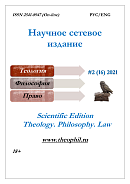Краткая аннотация
В статье анализируются особенности понимания проблемы объективно-всеобщего в экзистенциализме. Показывается, что, несмотря на то, что у авторов этого направления существуют установки на игнорирование этой проблемы, им не удаётся этого сделать в полной мере. В тоже время, отсутствие в их философии серьёзного анализа объективно-всеобщего приводит их к недопониманию глубинной сути и причин, поставленных ими проблем, а также закономерно склоняет их к выводам о трагичности, абсурдности и бессмысленности человеческого существования, о чуждости для человека внешнего ему мира и о внутреннем одиночестве личности, оказывающейся противопоставленной обществу. В современном мире всё большую популярность приобретают учения, отрицающие возможность полноценного познания объективных основ, законов и закономерностей мира. Преодоление наивных представлений о познавательном процессе, безусловно, является важным шагом вперёд, вместе с тем, такое пренебрежение проблемой объективно-всеобщего в общественных процессах, которое можно встретить во многих современных исследованиях, закономерно приводит к идеализациям, упрощениям, отрыву от понимания сути стоящих перед обществом проблем, к их поверхностной интерпретации. Это диктует необходимость критического анализа учений, породивших данные тенденции.
The article analyzes the peculiarities of understanding the problem of the objective-universal in existentialism. It is shown that, despite the fact that the authors of this direction have attitudes to ignore this problem, they do not manage to do this in full. At the same time, the absence of a serious analysis of the objectively-universal in their philosophy leads them to misunderstand the deep essence and causes of the problems they have posed, and also naturally inclines them to conclusions about the tragedy, absurdity and meaninglessness of human existence, about the alienness of the external world for a person and about the inner loneliness of a person who turns out to be opposed to society. In the modern world, teachings that deny the possibility of a full knowledge of the objective foundations, laws and laws of the world are becoming increasingly popular. Overcoming naive ideas about the cognitive process is certainly an important step forward, at the same time, such disregard for the problem of the objectively universal in social processes , which can be found in many modern studies, naturally leads to idealizations, simplifications, separation from understanding the essence of the problems facing society, to their superficial interpretation. This dictates the need for a critical analysis of the exercises that gave rise to these trends.

 0 позиций
0 позиций 




